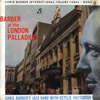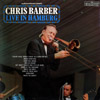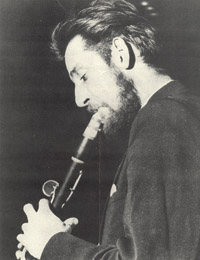 |
||||||||||||||||
| Ian Wheeler | ||||||||||||||||
|
||||||||||||||||
| You can read an obituary for Ian, published in the British newspaper, The Independent. | ||||||||||||||||
Ian Wheeler was a member of the Chris Barber Band for longer than almost any other of the thirty or so musicians who have come and gone since the band’s first date in May 1954. Moreover, he enjoyed two separate periods as a member of the front line: from 1961 to 1968, and then from 1979 to 1998, a total of over 26 years. Perhaps the most difficult public challenge Ian had to face was replacing founder and long-time band member Monty Sunshine, who left rather abruptly after the band’s third North American tour before Christmas in 1960. There were even some critics and fans who felt that Monty’s departure would spell the demise of the Barber outfit, but they failed to anticipate Chris’s determination, the individual and collective talents of the rest of the band, and not least the striking new sound that Ian would contribute to the front line. Not only was this qualitatively different from before – Ian’s tone on the clarinet was much warmer than Monty’s comparatively strident traditional New Orleans style – but he also added soprano and alto saxes (and later, harmonica) to the mix.
By the time Ian returned to the band some eleven years later (at the same time as Norman Emberson replaced Pete York on drums), Chris Barber’s Jazz Band had become the Chris Barber Jazz & Blues Band, an eight-piece outfit that included two reedmen. Ian replaced Sammy Rimington and joined John Crocker in the front line in a fruitful partnership that lasted nearly two decades. The next eighteen years were particularly prolific, both for Ian himself and the band as a whole. The period from 1979 to 1986 saw no personnel changes whatsoever, and this band alone recorded a total of more than fifteen LPs, most of which are now available on compact disc. Ian was also featured more frequently than before on harmonica, notable examples being Who’s Blues and Music From The Land Of Dreams. Ian’s last recording before leaving the band for the second time was That’s It Then, featuring tracks from several concerts by the Chris Barber Band with guest Acker Bilk. This CD includes a lovely clarinet trio piece, South, by Ian, Acker, and John, each vying for honours in an up-to-date version of the traditional “cutting contest”. |
||||||||||||||||
Music: Fidgety Feet (1961) || Sweet Lorraine (1961) || Basin Street Blues (1962) || Yvette (1962) || Down Home Rag (1967) || Saratoga Swing (1967) || Harlem Bound (1967) || Who's Blues (1984) || Music From The Land Of Dreams (1985) || Nobody Knows You When You're Down And Out (1985) || South (1996) |
||||||||||||||||
| "Introducing Ian Wheeler" | ||||||||||||||||
| This short article was published in the Volume 6, No. 12 issue of the Chris Barber Club booklets. This was the first issue to be published after Monty Sunshine's sudden departure from the band at the end of 1960 and his replacement by Ian Wheeler. | ||||||||||||||||
|
At seventeen, Ian joined the R.A.F. as a trainee pilot but was discharged on medical grounds, whereupon he entered the Merchant Navy and travelled the world. Unfortunately, riotous living and late nights took their toll and Ian found himself on terra firma, and in hospital. It was at this stage that jazz began to take a hand in his life, firstly in the shape of Josh White discs and secondly through the medium of early Humph recordings. Ian had a yen for the trombone and decided that this would be his instrument. However, his next move was to trade his ukelele for a guitar and he started "Josh Whiting" instead of "George Formbying". This move did not meet with the approval of his fellow patients who made no secret of their opinions as to his singing talents. On leaving hospital, Ian started to attend sessions at the Dutch House, Lee, and managed to obtain an occasional sit in with the Charlie Galbraith Band. Later on, pianist Mike Jefferson asked him to join a trio which included Dave Webb on clarinet. Time went by and Ian received one or two offers from other bands, but he was a little unsure of himself and it was not until 1950 that he joined a band led by clarinet player Charlie Connor. By now Ian was beginning to tire of the guitar and the clarinet of Charlie Connor was having its influence. Ernie Hitchcock, the band's trumpet player, offered him an old, simple system clarinet for twenty-five shillings so Ian said goodbye to thoughts of the trombone and accepted the offer. Ian's first attempts at playing his newly acquired instrument produced no sound whatsoever and it was his friend and clarinettist Fred Lunn who gave Ian the news that a clarinet needs to have a reed inserted in the mouthpiece. Ian was ignorant of reeds and mouthpieces but he was to learn a lot of them in future years. Hard work plus sound advice from Charlie Connor and Fred Lunn helped Ian to gain some control of his clarinet and it was not long before he was being featured on clarinet with the band. But Ian was still very raw and Fred Lunn together with Hughie Goodwin, a close friend, began to pump Johnny Dodds and George Lewis into him morning, noon and night. Every weekend, Ian had been in the habit of accompanying a group of musicians to Mottingham woods and practicing in the open air. Now they decided to form a band and Ian, rather regretfully, gave in his notice to Charlie Connor, bought a new clarinet, and the River City Jazz Band was formed. About this time, Ian would make the short journey to the Catford Jazz Club where, every week, the Mike Daniels Band could be heard and Mike would allow Ian to sit in with the band. Came another break when, in mid 1953, Teddy Layton vacated the clarinet position and Ian was offered the post. "You're not much good yet", said Mike, "but you've got promise so I'll take a chance." Ian handed over the leadership of the River City Jazz Band to Ted Prior and gratefully accepted Mike's offer. The band of the moment around the Clubs was that led by Ken Colyer and Ian had cast his ambitions in this direction. Came the break up of the Colyer band and Ian's hopes rose. But again Ian landed in hospital, although this time it was only for a month. When Ian was discharged from hospital he discovered that Mike Daniels had engaged another clarinet player and when he re-joined the band it was on soprano sax. A serious car crash put Ian back in hospital and it wasn't until late 1954 that he was able to resume duties with the Mike Daniels Band. But Ian was not destined to remain with the band for much longer. Ken Colyer's clarinet player (one Acker Bilk) left the band and Ian was asked to fill the vacancy. Mike Daniels was very understanding and a week later Ian was on his way to Germany, a professional musician with the Colyer Band. Ian had a long and happy stay with the Colyer band until 1960 and then decided to form a band with Ken Sims which included ex-Colyer trombonist Mac Duncan. The year passed pleasantly and quickly with this new band. Then came Christmas and with it what Ian describes as his best ever Christmas present: the offer to join the Chris Barber Band. Ian will probably take a little time to settle down in his new surroundings but I am sure he is in for a long stay and I know he is looking forward to meeting you at the various venues at home and abroad. By the way, if you want to make him a friend for life, he drinks Barley Wine. |
||||||||||||||||
|
||||||||||||||||
| Scans from 1980s Concert Programmes | ||||||||||||||||
 |
||||||||||||||||
| Ian Wheeler Photo Gallery | ||||||||||||||||
| These photographs and more have been used in a slideshow. | ||||||||||||||||
|
||||||||||||||||
























